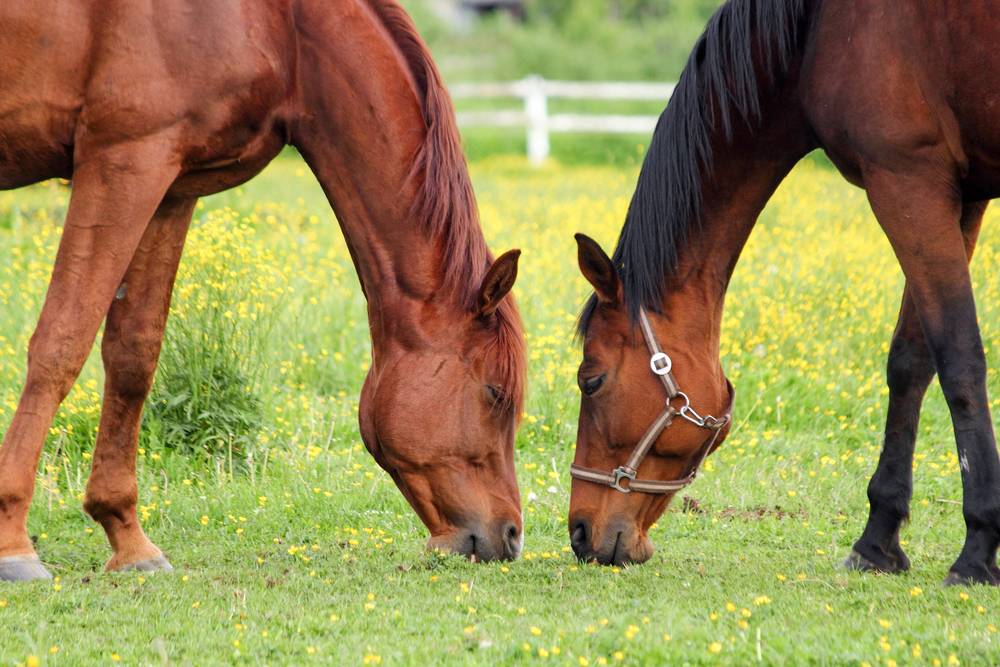It is commonly thought of that respiratory problems in horses are predominantly linked to the winter months. For some equines, this is very much the case and when they are given the chance for fresh air and less stable time their breathing difficulties may very well improve.
However for a growing number of horses, spring and summer brings its only set of concerns with the onset of allergies. Recurrent Airway Obstruction (RAO) has been a hot topic for many years, but lesser known is Summer Pasture Associated Obstructive Pulmonary Disease (SPAOPD).
SPAOPD or other spring and summer allergies can be hard to manage, because it is difficult to prevent a horse from breathing in air that contains pollen and other potential allergens. However, there are some simple management tricks you can implement, as we investigate in our latest blog…
What could be the cause?
If you have noticed that during certain seasons (often April and May – potentially due to Oilseed Rape being grown) your equine friend begins to cough, have a runny nose, head shake, lack in energy, or just generally seem a little below par – for no apparent reason – this could be caused by SPAOPD.
There are two likely culprits, the first of which is hayfever. Yes… just like humans, horses can also suffer from hay fever triggered by the release of pollen from trees, plants or grasses.
If you have excluded any chances of a virus or other respiratory disorder (always consult with your vet if you are in any doubt) then hayfever could be the cause.
In addition to hayfever and pollen related reactions, dust can also be a problem in the warmer months – particularly when the ground is dry. Other potential triggers could be due to more time spent in poorly ventilated transport and dry arena surfaces.
What causes SPAOPD?
Simply put, if the body is allergic to a certain airborne allergen, when it reaches the nasal passages the body will trigger a reaction to fight against the foreign body. This can cause inflammation and narrowing of the airways which may result in coughing, nasal discharge, head shaking and more serious breathing issues.
Can SPAOPD be managed?
There are a number of ways you can assist in the management of respiratory problems in the summer months. Here we look at a handful of them…
Identify the trigger. The easiest way to identify what kind of pollen your horse is allergic to, is to monitor his reaction at different times of the day and the year. Keep an eye on the pollen count in your area and keep a diary of his reactions. Take note of anything that might be being grown or harvested in your area – such as Oilseed Rape, or during hay cutting season.
Protection. Using a physical barrier such as a nose net may help to prevent pollen from entering the nasal passage and triggering a reaction. Many fly masks have a nose net attached to them for field use, and you can purchase specific nets to attach to bridles during ridden work.
Time management. The pollen count is often lower at night so switching up your horse’s routine to be stabled during the day and out at night may help to alleviate the symptoms. Be mindful to ensure stabling is as dust-free as possible to remove any other potential allergens.
Take a rest day. On days when the pollen count is particularly high, it may well be beneficial to give your horse a day off – or ride early in the morning or later in the evening to reduce exposure to allergens. If your horse has restricted airways during exercise it can be very stressful for both horse and rider to continue.
Minimising dust. You can soak feed and hay to reduce the amount of moulds and spores that your horse is coming into contact with, and choose dust extracted, high quality bedding to stable your horse on if he is in for any length of time.
Support immunity. A balanced diet will contain a range of vitamins, minerals and antioxidants – all of which will help support a healthy immune system and enable your equine to be fighting fit and less likely to succumb to secondary infections or more severe respiratory compromise.

A natural approach. Using carefully selected ingredients that have been shown to support a healthy respiratory system can assist in the management of SPAOPD. Look for ingredients such as menthol, eucalyptus and aniseed as a starting point. Horslyx Respiratory Balancer contains these important ingredients to help keep airways clear of mucus as well as anti-oxidants, vitamins, minerals and trace elements. You can see how our Balancer can support your horse here.
Veterinary prescriptions. For some horses it may be necessary to administer medicinal products such as corticosteroids and anti-inflammatories. If you are in any doubt as to whether your equine needs medical attention, always consult your vet.
Have you found that your horse suffers from respiratory conditions more during the spring and summer months? How have you found it best to manage this condition? Please do share your experiences with us over on our Facebook page here.

